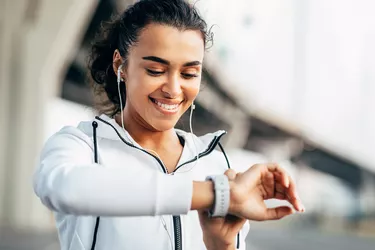
The COVID-19 lockdowns forced fitness-minded consumers to find creative ways to stay active. But it also might have made you aware of the value that comes with monitoring your heart rate. A heart rate monitor can help you adjust your workout intensity, but it can also serve as a way to track your health.
What Are Heart Rate Trackers?
Video of the Day
Your heart is key to your overall body health. Your heart pumps oxygen and nutrients throughout your body via your blood, so a normal heart rate can be a reassuring sign. But "normal" varies from one person to another, so it's important to be aware of your standard heart rate so that you'll know when something's off.
Video of the Day
You can measure your heart rate by pressing two fingers to your neck. But it's easy to forget to do that on a regular basis. A heart rate monitor works in the background throughout the day, gathering data on your resting and active heart rates to deliver you long-term averages.
Benefits of Heart Rate Trackers
A heart rate monitor measures electrical signals from your heart, with the results displayed either on the face of the monitor or in an app connected to the device. Most often, these monitors are worn around the chest. Here are some benefits of heart rate trackers:
- Early heart issue detection: While no technology could completely replace regular healthcare, keeping an eye on your heart rate can help you see abnormalities. If your rate spikes suddenly or is elevated for an extended period of time for no reason, it could be the thing that gets you to the doctor early enough to find and fix any problems.
- COVID-19 detection: One of the signs of COVID-19 infection is an irregular or high heart rate. If your heart rate monitor shows an abnormal heartbeat over the course of a day or more, it could be a sign you have COVID.
- Workout optimization: To get the biggest benefits out of your physical activity, you'll need to get to a certain heart rate range for a period of time. If you're healthy, your heart rate monitor can help you ensure you're getting the most from your workouts.
- Overexertion: Monitoring your heart rate, and knowing your targets, can help you know when you're overdoing it. You can even set up alerts that will let you know when you exceed a certain range.
How to Wear Trackers
If you're shopping around for a heart rate monitor, you might be torn between one that straps onto your wrist and one that goes around your chest. While the latter can be less convenient, it can be tempting to assume it's more accurate.
The good news is, according to a study in BMC Sports Science, Medicine and Rehabilitation, there's no notable difference between the two. If you'll only remember to strap on your monitor when you work out, you may want to opt for a wrist-based model that you'll wear all the time. Just make sure you attach it two fingers above your wrist bone to get the most accurate results.
Best Apps for COVID Trackers
If you have a fitness tracker, heart rate monitoring will probably be built-in. But a dedicated heart monitor may have more features. If you won't be tracking your steps or logging your meals, a heart rate monitor may be a better option. But if you're simply buying one for COVID tracking, a fitness tracker may suffice.
Your heart rate monitor will connect to an app that provides the reporting you need. But if you have a smartwatch, an app like Cardiogram or Heart Trace 2 could be all you need. For COVID, you may also want to invest in a pulse oximeter that helps you monitor your oxygen saturation, which is another COVID marker.
If you're looking specifically for a tracker that can help you during COVID, it may help to look for one that will give you benefits beyond the pandemic. As you learn more about your normal heart rate, you'll be able to detect when you're overdoing it during exercise, when you're in your target zone and when you might need medical attention.
- Harvard Health Publishing: How’s Your Heart Rate and Why It Matters?
- Cleveland Clinic: How a Heart Rate Monitor Can Be Beneficial to Your Workouts
- American Heart Association: Target Heart Rates Chart
- BMC Sports Science, Medicine and Rehabilitation: Wrist-Worn Optical and Chest Strap Heart Rate Comparison in a Heterogeneous Sample of Healthy Individuals and in Coronary Artery Disease Patients
- Suunto: How To Get More Accurate Wrist Heart Rate Readings – Tips and Troubleshooting Steps